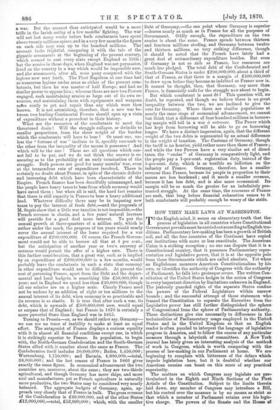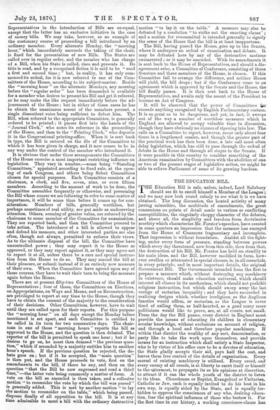HOW THEY MAKE LAWS AT WASHINGTON.
TO the English mind, it seems an elementary truth that the' process of legislation in all countries where Constitutional Government prevails must be carried out according to English tra-
ditions. Parliamentary law-making has been a growth of British soil, and all the free countries of the Continent have copied our institutions with more or less exactitude. The American
Union is a striking exception ; no one can dispute that it is a. Constitutional country, that it possesses Parliamentary repre- sentation and legislative power, that it is at the opposite pole- from those Governments which are called absolute. Yet when, an Englishman measures American Constitutionalism by his own, or identifies the authority of Congress with the authority of Parliament, he falls into grotesque errors. The written Con- stitution of the United States hedges in the action of Congress - in every important direction by limitations unknown in England.. The jealously guarded rights of the separate States confine the powers of the Federal Legislature within narrow bounds ; and the successful attempt of those statesmen who. framed the Constitution to separate the Executive from the- Legislative power has still further distinguished the sphere. of Congressional from the sphere of Parliamentary authority. These distinctions give rise necessarily to differences in the- technicalities of Parliamentary usage employed in the Unitech States and in the United Kingdom so that an English reader is often puzzled to interpret the language of legislative- progress in America, and to follow the course of any particular- measure through a labyrinth of committees. A New York journal has lately given an interesting analysis of the method.. of work in Congress, which is worth comparing with the- process of law-making in our Parliament at home. We are- beginning to complain with bitterness of the delays which impede legislation here, but it is doubtful whether our- American cousins can boast on this score of any practical superiority.
The matters on which Congress may legislate are par- ticularized in the Eighth and Ninth Sections of the First Article of the Constitution. Subject to the limits therein laid down, any member of Congress may introduce a Bill, but his control over the measure is by no means as strict as that which a member of Parliament retains over his legis- tive charge. The powers of the Senate and the House of Representatives in the introduction of Bills are co-equal, except that the latter has an exclusive initiative in the case of money bills. We may take, however, as an example of the customary coarse of proceeding a bill introduced by an ordinary member. Every alternate Monday, the "morning hour," which immediately succeeds the taking of the chair, is fixed for the presentation of new Bills. The States are called over in regular order, and the member who has charge of a Bill, when his State is called, rises and presents it. Its title is read, and by a recognized fiction it is said to be "read a first and second time ; " but, in reality, it has only com- menced its ordeal, for it is now referred to one of the Com- mittees of the House, according to its subject-matter. Beside the "morning hour" on the alternate Mondays, any morning before the "regular order" has been demanded is available for a member who desires to present his Bill and get it referred, or he may make the like request immediately before the ad- journment of the House ; but in either of these cases he has to obtain the unanimous assent of the members present, a single dissentient voice being sufficient to defeat him. The Bill, when referred to the appropriate Committee, is generally ordered to be printed ; it passes first into the hands of the "Journal Clerk," who notes its reference in the proceedings of the House, and then to the "Printing Clerk," who deposits it in the Congressional printing-office. When it is sent back in type, the Bill is entered on the file of the Committee to which it has been given in charge, and it now ceases to be in any way under the control of the member who introduced it.
It is obvious that under these arrangements the Committees of the House exercise a most important restricting influence on legislation. They vary in number,—some being "Standing Committees," appointed according to fixed rule, at the open- ing of each Congress, and others being Select Committees chosen for special purposes. Each Committee consists of a chairman, a clerk, and five, seven, nine, or even fifteen members. According to the amount of work to be done, the Committee assembles frequently or otherwise, and presuming the Bill whose course we are following to refer to some matter of importance, it will be some time before it comes up for con- sideration; Numbers of bills, generally worthless, but perhaps sometimes of real utility, are put aside as undeserving attention. Others, seeming of greater value, are referred by the chairman to some member of the Committee for examination. They are reported back, and then the Committee proceed to take action. The introducer of a bill is allowed to appear and defend his measure, and other interested parties are also often, though not always, permitted to enforce their views. As to the ultimate disposal of the bill, the Committee have uncontrolled power ; they may report it to the House as approved, or they may report against it, or they may agree not to report it at all, unless there be a rare and special instruc- tion from the House to do so. They may amend the bill at their pleasure, or submit instead of it an entirely new measure of their own. When the Committee have agreed upon any of these courses, they have to wait their turn to bring the measure again before the House.
There are at present fifty-two Committees of the House of Representatives ; four of these, the Committees on Elections, on Appropriations, on Ways and Means, and on Reconstruction, are privileged to report at any time to the House, though they have to obtain the consent of the majority to the consideration of their decisions. Other Committees, however, have to wait until they are called upon for their reports. For this purpose the "morning hour." on all days except the Monday before mentioned is set apart, and each Committee is entitled to be called in its turn for two consecutive days. The chair- man in one of these "morning hours" reports the bill as approved to the House, and the question is then debated. The reporter of the bill is permitted to speak one hour ; but if he desires to go on, he must then demand "the previous ques- tion," which if seconded by a majority entitles him to another hour's speech. If the previous question be rejected, the de- bate goes on ; but if it be accepted, the "main question" is then put, and the House proceeds to vote, first on the amendments to the bill, if there be any, and then on the question "that the Bill be now engrossed and read a third time,"—the latter vote being commonly a matter of form. A vote on the bill as amended is then taken, and a collusive motion .‘ to reconsider the vote by which the bill was passed" is generally added. This is met by another motion "to lay the motion to reconsider on the table," which being passed, disposes finally of all opposition to the bill. It is at any time admissible to meet a bill with the ordinary destructive motion "to lay it on the table." A measure may also be defeated by a resolution "to strike out the enacting clause" ; and a motion for recommittal is intended generally to signify the sense of the House that the bill is at least inopportune.
The Bill, having passed the House, goes up to the Senate, where it undergoes an ordeal of examination and debate. It may be defeated here by any of the destructive motions enumerated ; or it may be amended. With its amendments it is sent back to the House of Representatives, and should a dis- agreement arise, a Committee of Conference, consisting of three Senators and three members of the House, is chosen. If this Committee fail to arrange the difference, and neither House will yield, the bill drops ; but if the Conference come to an agreement which is approved by the Senate and the House, the bill finally passes. It is then sent back to the House of Representatives, and awaits only the assent of the President to become an Act of Congress. It will be observed that the power of Committees tor exceeds anything recognized by English Parliamentary custom. It is so great as to be dangerous, and yet, in fact, it sweeps out of the way a number of worthless measures which in England are allowed to occupy valuable time in discussion, though they have obviously no chance of ripening into law. The calls on a Committee to report, however, occur only about four times in a lengthened session, and though the greater part of the practical work has then been done, a late call must often delay legislation, which has still to pass through the ordeal of debate in the House and through all stages in the Senate. If it were possible in this country to combine something of the American examination by Committees with the abolition of one or two of the present stages of legislative action, we might be able to relieve Parliament of some of its growing burdens.































 Previous page
Previous page